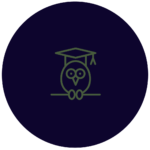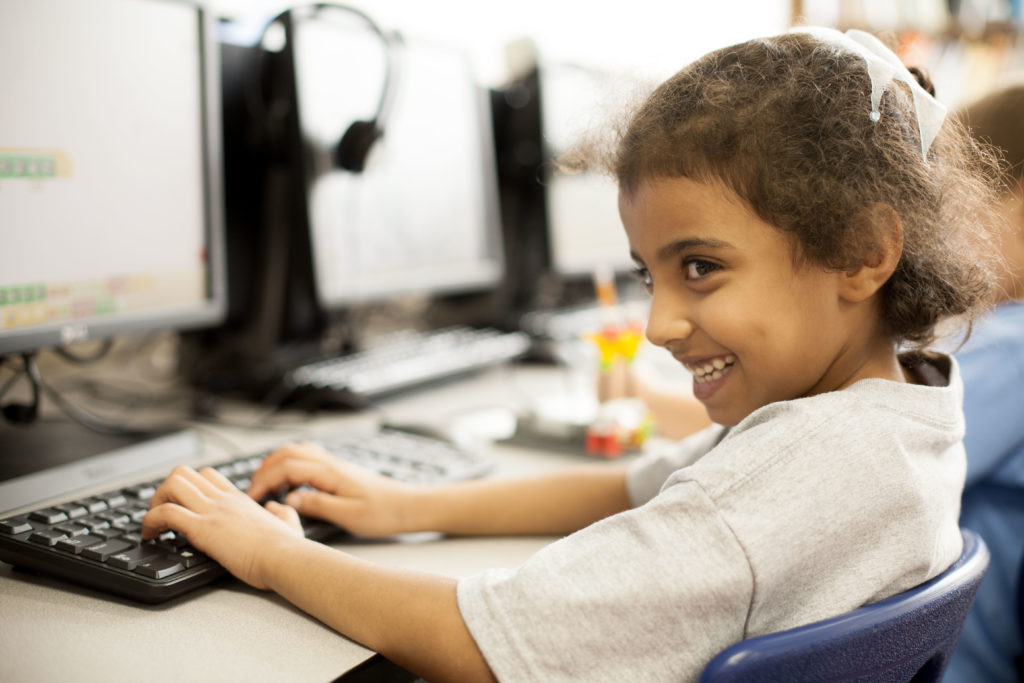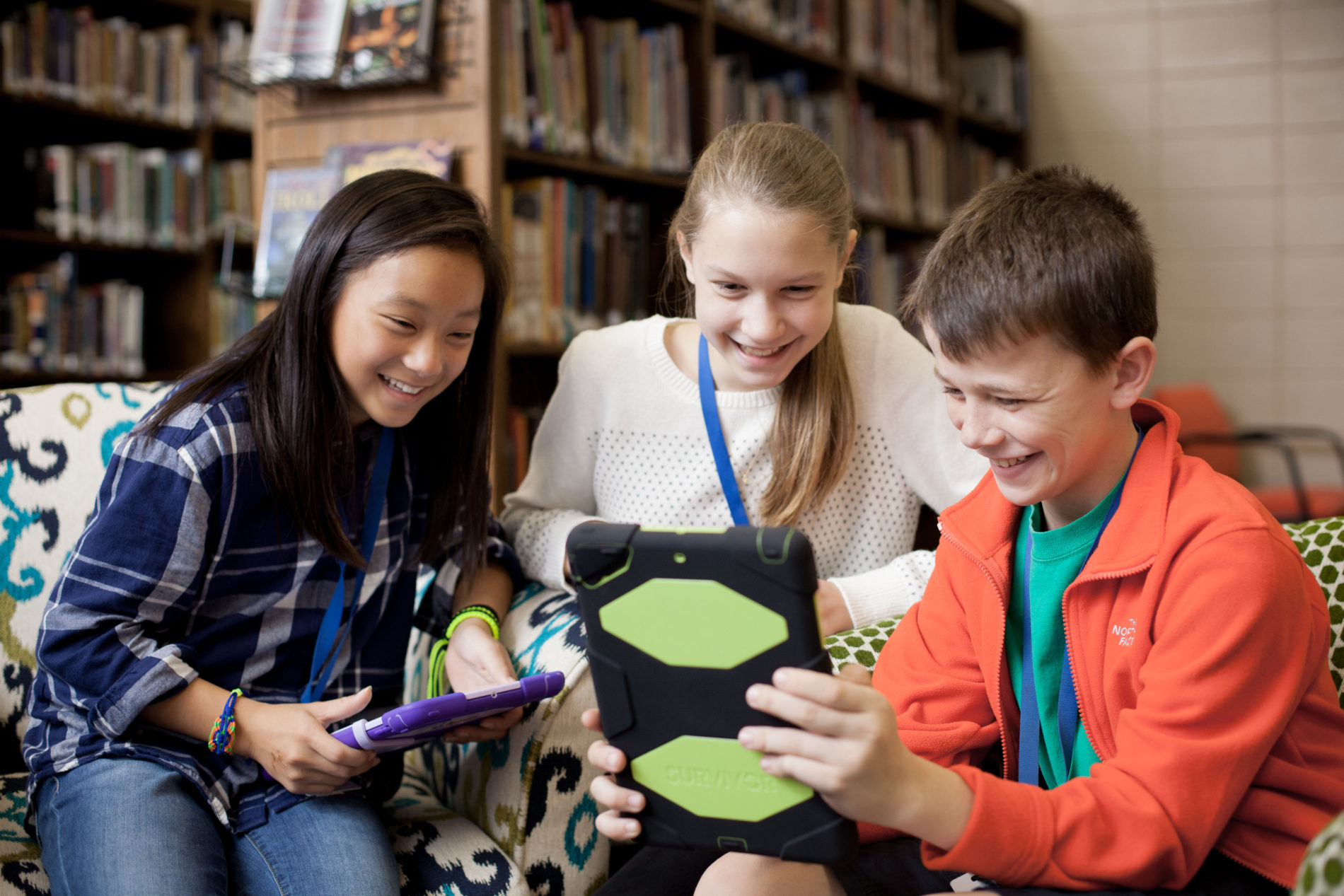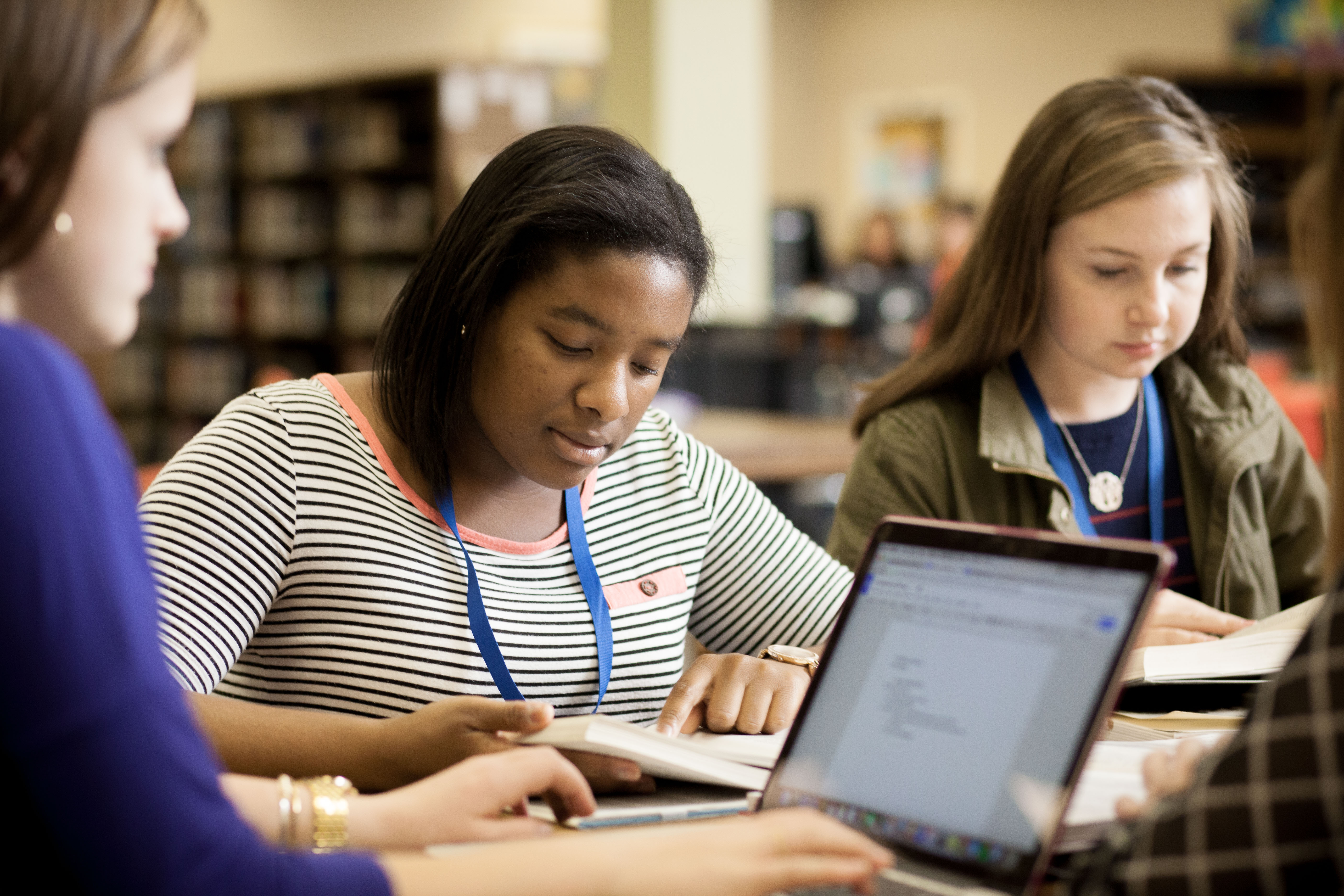Lower School (Grades Preschool – 4)
Because children love to explore and embrace the world using all of their senses, instruction extends beyond the classroom walls. Frequent field trips, special guest speakers, and virtual tours give students firsthand experiences that bring classroom lessons to life.
Discovery and challenge are the hallmarks of the pre-school and lower school programs at Gaston Day. Students and teachers work together to discover new concepts, master skills, learn important facts, and weave them all together into an exciting “tapestry of knowledge.”
Language arts and mathematics provide the basic structure for the academic day. Specific blocks of uninterrupted time are devoted for instruction and mastery in these areas, combining a myriad of activities to allow for individual, small group, and whole class instruction.
Our multisensory approach to education extends to the world of fine arts, where lessons in music, art, and drama are coordinated with units of study in the classroom.
Through a deliberate program of character education we encourage our students to become caring and empathetic toward their peers, the community in which they live, and their global neighbors.
Every task is designed to help them take intellectual risks and become confident, knowledgeable, reflective, and open-minded.
Middle School (Grades 5-8)
Middle School is a time of growth, change, and discovery. Our goal is to foster the development of healthy, happy, responsible, and productive adolescents. They have a new freedom and independence that is accompanied by support and guidance from teachers. Organizational, communication, and social skills are honed through classroom and homework assignments, projects, and social and athletic opportunities. Academic abilities and interests are challenged through rigorous coursework with unique lessons that offer students the opportunity to participate in project-based learning and design thinking. During these years, our children become adolescents. They have the opportunity to take risks, discover talents, and stretch themselves in the comfort of a wholesome, nurturing environment.
The advisory program focuses on a Middle School student’s needs for relationships, autonomy, competence, and fun. Simply put, all students want to feel connected to other people, want to be independent, want to experience success while feeling like a worthwhile, significant person, and want to have a good time. Students begin each year by drafting a social contract that identifies the guidelines and expectations required to create the social climate in which they would like to learn. Following the establishment of the year’s social contract, advisors meet regularly with advisee groups to discuss pertinent issues or current events and lead activities on diversity, awareness, communication, and life skills. Students’ homeroom teachers serve as their advisors, guiding students through age appropriate topics each year.
To develop innovative problem solvers that can confidently share their voice with the world, Gaston Day students complete at least one presentation in each class, every year. These presentations often follow problem-based learning, where students learn to solve the problems of tomorrow while applying the lessons of today. Students research, create solutions, collaborate, and utilize technology throughout these projects to develop authentic answers. Students then share their solutions with their teachers and peers through a variety of different presentation formats designed to build confidence and promote creativity.
As our students navigate the challenges of an accelerated curriculum, Gaston Day works to create balance and alleviate stress throughout each day by providing a schedule tailored to an adolescent’s needs. Students enjoy a rotating schedule that allows each class to have access to a student’s peak learning hours during the day, while affording students two breaks from the academic rigour to decompress, catch up with friends and refuel the body and mind. Recent adjustments to the middle school schedule have focused on improvements to increase peak learning minutes across classes and encourage teacher collaboration in creating connections for learning across the curriculum through shared learning projects.
Digital resources are an integral part of daily life for students at Gaston Day School. All classrooms are equipped with Smart Televisions and other interactive technologies to engage our “connected” learners and encourage collaboration, learning, and productivity. Our 1:1 iPad program for students in grades 5-8 not only helps students learn necessary technology concepts and operations, but also expands their ability to use the device for research, effective communication, and innovation. Students in grades 5-8 also have access to two mobile computer labs for computer-based instruction, along with a MakerSpace and Robotics Lab to encourage design thinking while building soft skills. In advisory, teachers lead discussions on human, cultural, and societal issues related to technology, including the responsible and ethical use of information and technology. Gaston Day School’s student/family/faculty web portal, OnCampus, gives students and families online “on-demand” access to assignments, course handouts, student grades, and due dates.
The George F. Henry III Library serves the students in the Lower, Middle, and Upper Schools and offers resources for individual and class research for students. The library’s current collection contains 12,915 cataloged volumes. In addition to many print periodicals, Gaston Day Students and faculty have full access to over 1,000 electronic magazines, journals, academic audio and video clips, and primary source material through our subscriptions to EBSCO and Questia online databases.
Gaston Day School evaluates curriculum and grade level performance through the yearly administration of the CTP-V. Each winter, students in grades 5 – 8 take the CTP-V, a standardized, nationally-normed instrument that measures quantitative reasoning, verbal reasoning, math achievement, and application skills. Percentile scores are shared with parents and provide important comparative information for curriculum planning and individual academic advising. Students are prepared for the CTP V through their normal courses of study that emphasize higher-order thinking skills. CTP-V test results have been found to be predictors of academic success and have a high correlation with SAT scores.
Volunteerism is an important component of the educational mission at Gaston Day School. Involvement in service activities enables students to learn about the needs of individuals and the community while instilling a sense of personal responsibility and commitment to others. Students participate in a variety of different service activities throughout the year. The President’s Service Award, signed by the President of the United States, recognizes Middle School students who have served 50 or more hours in a one-year period. Awards are presented at the school’s awards ceremony each spring.
Middle School Curriculum
| Fifth Grade | Sixth Grade | Seventh Grade | Eighth Grade |
| English | Literature and Composition |
| Science | Earth Science | Life Science | Conceptual Chemistry | Conceptual Physics |
| Math | 5th Grade Math | 6th Grade Math | 7th Grade Math
Honors 7th Grade Math
Honors Algebra I | Pre-Algebra
Honors Algebra I
Honors Geometry |
| Social Studies | World Geography | World Geography | American History | World History
(Ancient through the Renaissance) |
| World Languages | Spanish | Spanish | Spanish Language Acquisition (study of Greek and Latin roots, prefixes and suffixes) | Spanish I
French I |
| Electives | Students enroll in three electives each year; one music class (chorus/drama or band) plus technology and art. | | Students enroll in one elective each year; chorus, band, art, or drama. Electives meet 5 times in a 7-day rotation.
| |
| Physical Education | P.E. classes meet 3 times in a 7-day rotation. |
Upper School (Grades 9-12)
Upper School is a time of focus, self-exploration, and achievement. Our goal is to challenge students to discover who they are and who they want to be—and then to partner with them and develop a plan that enables them to get there. A rigorous curriculum of standard, honors, Advanced Placement, and elective courses ensures that students are well prepared for success in college and beyond. Classes are taught with student-centered instructional strategies that promote collaboration and creativity while developing problem-solving, critical thinking, and leadership skills. We also offer extensive co-curricular opportunities in athletics, clubs, leadership, and the visual and performing arts to promote student growth outside of the classroom, as well.
Gaston Day students are the innovators, engineers, and leaders of the future. Our students learn to think critically and create solutions to the challenges that face our community, both today and tomorrow. The School’s current facilities, equipment, and instruction from our exceptional teachers allow us to provide a high-quality STEM education that prepares students for higher-level science courses in college. Students have the opportunity to take a variety of STEM courses, including Engineering, Research Methods, Calculus, and Computer Science. These courses are taught in state-of-the-art science facilities and a newly renovated makerspace with access to 3-D printers, laser cutters, and CNC machines.
All students have the opportunity to learn soft skills through collaborative assignments, project-based learning activities, and real-world examples. Our soft skills curriculum is made up of 22 skills, and each course provides students with multiple opportunities to learn about a skill, understand what it looks like in a specific scenario, and then practice it on an assigned task. Students are provided with feedback on their performance and reflect on their development of soft skills at annual student-led conferences.
The goal of the Circle Program is to better monitor and display students’ progress towards fulfilling the school’s Portrait of a Graduate statement. The Circle Program aims to do this by looking at students’ academic and personal growth in ways that would be difficult to do in a single class. The Circle Program emphasizes students making connections between academic disciplines, owning their successes and failures, and setting goals for future development. To accomplish these goals, the Circle Program requires students to keep portfolios of their work, regularly report on and defend their development, and integrate a final senior project into their Gaston Day School experience.
All Upper School students at Gaston Day School have a faculty advisor. Students are assigned an advisor based on individual interests and needs at the beginning of their 9th grade year and keep the same advisor through graduation. Advisors meet regularly with advisee groups to discuss pertinent issues or current events and lead activities on diversity, awareness, communication, and life skills. Advisors also meet individually with students and parents to provide academic support and monitor student progress throughout the school year.
Our leadership programs are designed to prepare students to make an impact by encouraging them to follow their passions, building their confidence and empathy, and helping them embrace their strengths and weaknesses. Every student has an opportunity for leadership at Gaston Day School either on the athletic field, on the stage, in clubs, or in the classroom. Students also have the opportunity to serve as leaders on the Upper School Student Government where they discuss relevant student issues and make recommendations for change on campus. Students in 9th and 10th grades participate in a one day leadership workshop that helps prepare them for greater leadership roles on campus during their 11th and 12th grades.
Upper School offers a wide variety of clubs that promote leadership and collaboration while allowing students to explore their passions and interests outside of the classroom. From 3-D Printing Club to Green Team to International Council, Gaston Day School provides an opportunity for students to explore their strengths and uncover new interests. All club activities and meetings are led by student officers and are supported by club members. If a club is not currently being offered on campus, students have the opportunity to start a new club by securing a faculty sponsor.
Volunteerism is an important component of the educational mission at Gaston Day School, and students are encouraged to extend themselves and actively serve as volunteers in the larger community. Involvement in service activities enables students to learn about the needs of individuals and our community while instilling a sense of personal responsibility and commitment to others. Upper School students must complete a minimum of 25 hours of volunteer service each year, although many exceed this requirement. During their junior year, students plan, organize, and execute a community service project of their choice with guidance from their advisors. The President’s Service Award, signed by the President of the United States, recognizes Upper School students who have served 100 or more hours in a one-year period and is presented at the annual awards ceremony each spring.
Near the end of eighth grade, students meet individually with the college counselor to develop their preliminary four-year course plans. The 9th and 10th grade years expand on those plans to include personal development goals, the focusing of co-curricular activities to achieve those goals, and an initial look at the college process timeline. The 11th grade year focuses on preparing to write personal statements and college essays and exploring college options through a number of on-campus college visits. College Placement services culminate in the 12th grade with the college application process, scholarship application process, and final selection of college or university.
Agnes Scott College
Anderson University
Appalachian State University
Arizona State University
Auburn University
Belmont Abbey College
Brenau University
Brevard College
Brown University
Carolinas College of Health Sciences
The Citadel
Clemson University
College of Charleston
Columbia College
Davidson College
Drexel University
Duke University
Elon University
Emory University
Furman University
Harvard College
James Madison University
Lenoir-Rhyne University
Massachusetts Institute of Technology
New York State University
North Carolina State University
Queens University
Rhodes College
Samford University
Southern Wesleyan University
University of Mississippi
UNC-Asheville
UNC-Chapel Hill
UNC-Charlotte
University of South Carolina
University of Alabama
University of the South
Univeristy of Tennessee
University of Washington at Seattle
Vanderbilt University
Virginia Tech
Wake Forest University
Washington and Lee University
Wheaton College
Wofford College
Yale University
All 9th, 10th, and 11th grade students are required to take the PSAT, and all 11th and 12th grade students take the SAT and/or the ACT.
| English | 4 credits |
| Mathematics | 4 credits (including Algebra I, Geometry, Algebra II, and one more advanced math course) |
| Science | 3 credits of lab sciences (including Biology, Chemistry, and one more advanced science course) |
| Social Studies | 3 credits (including World History, U.S. History, and Government and Economics) |
| Foreign Language | Successful completion through level III of either French or Spanish |
| Fine Arts | 2 credits |
| Physical Education/Health | 1 credit |
| Electives | 4+ credits (available in all subject areas) |
| Senior Project | All seniors must complete a special project or internship in their senior year (0.25 credit) |
| Community Service | 25 hours of volunteer service required each year |
The Learning Academy provides students an environment where teachers and specialists are devoted to helping them excel.
The Coordinate Program is designed for students at Gaston Day who are diagnosed with a specific learning disability or a significant attentional disorder needing the Language Arts/Math Curriculum presented in an individualized instructional setting. Students work to remediate and strengthen skills for a transition back to the mainstream of Gaston Day School. Academy teachers work closely with the classroom teacher, family, and student to provide the support needed. Daily Academic Coaching is included for students enrolled in the Full Coordinate Program. A student enrolled in Coordinate Language Arts or Coordinate Math is provided three days of Academic Coaching.
The Early Reading and Math Intervention Program provides an individualized, multi-disciplinary, diagnostic, prescriptive program designed to meet the specific needs of each child with a diagnosis of a learning disability/attention disorder.
The Academic Coaching Program is designed to meet the needs of students who have difficulty keeping track of assignments and organizing school materials. It can also provide short-term tutorials to reinforce concepts presented in the classroom. The Academic Coach serves as an advocate and lends help with studying, reviewing, note-taking, test preparation, and other academic needs.
The Student Services Program is designed to meet the needs of students in upper school who have difficulty keeping track of assignments and organizing school materials. The Student Services faculty serves as an advocate and lends help with studying, reviewing, note-taking, test preparation, and other academic needs.
The Single Course Tutoring program is designed to serve students in grades 9-12 enrolled in The Learning Academy who are experiencing difficulty in a single subject area (math and language arts).
Sessions may include fine and gross motor coordination training, therapeutic exercises, self-care training, sensory integration training, visual motor training, neuromuscular re-education, cognitive therapy, adaptive equipment training, or child/caregiver education. A licensed physical therapist will work with children one-on-one or in small groups.
The Speech & Language Program provides support to students who need additional help in articulation, fluency, voice, or language. Children work individually or in small groups with a certified speech and language pathologist. In addition to developing verbal skills, speech pathologists play a key role in the prevention of literacy problems.
Get to Know Us.
Let us know you’re interested and we’ll send you everything you need to get started.
I’m Interested.
Schedule a Tour.
See the full campus, visit the classrooms, and meet the exceptional faculty and staff.
Show Me Around.
Apply for Admission.
Ready to enroll? Begin the admission process by submitting an online application form.
Let’s Do It.






